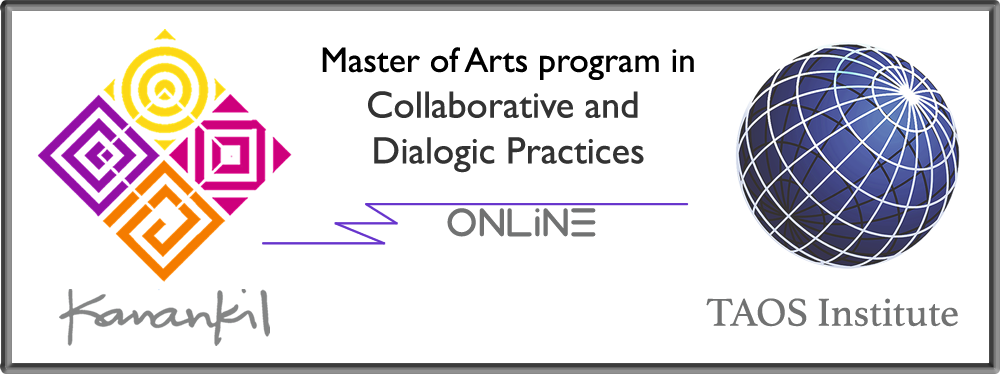
The Kanankil Institute -Taos Institute Master of Arts degree in Collaborative and Dialogic Practices (MA in CDP) will be launched in January 2018 with its first cohort. In this two-year online learning program participants will learn about and explore different applications of Collaborative and Dialogic Practices related to professional life as social workers, health professionals, lawyers, psychotherapists, educators, managers and coaches working with individuals or organizations.
To apply, click here: Application Form. (You will be redirected to the TAOS Institute Website)
This program has been offered in Spanish for the past twor years and is now being offered in English to practitioners/participants from around the world. We invite you to consider applying for this exciting new program.
The MA in CDP is officially recognized by the Secretariat of Public Education of Mexico [Secretaria de Educacion Publica, SEP] (RVOE: 2112, dated August 27, 2015) and has been operating for two years. As Mexico is one of the countries subscribed to the International Agreement of The Hague, this course of study is valid in all the countries which subscribe to that agreement. The educational requirements allow graduates of the MA in CDP to continue on to doctoral studies if desired. Because the practice of the profession is regulated by each country/state, the graduate of the program is responsible for the arrangements needed to pursue his/her professional practice in any location outside Mexico. The Kanankil Institute has been awarding Family and Couples Therapy and Psychotherapy degrees since 2004. The Taos Institute joins Kanankil in offering this program for the first time in English.
Student Comments about the program:
What did the Master program in CDP at the Kanankil Institute do for me? So many things. The program itself was amazing. We heard people from all over the world describe how they work; different ways they apply what we were learning in their particular contexts; the challenges they met and how they developed ideas to confront them. And we did the same in our own contexts. Then there was Kanankil as a community in itself. We all come from different environments with distinct visions and ways of being. The confluence of perspectives was sometimes challenging, but more often than not, enriching. Conversations and projects range from interesting to inspiring. Curiosity becomes a permeating motor that reaches out into other aspects of our lives and drives us on to getting to know those around us. Kanankil isn’t limited to a profession. It can become a way of seeing the worlds we wander through. It can become a way of one’s own participation within them.
- Cindy Bauserman (USA & Mexico, Life Coach and Educator)
Kanankil was one of the most transformative experiences in my life. It opened me up to new personal and professional horizons that led to a multiplicity of perspectives and possibilities that would never have been explored in another context.
- Alfonso Galan (Mexico, Psychotherapist)
The Kanankil online master’s program has been an experience that has enriched me as a professional, giving me the possibility of having dialogues with my colleagues and teachers that have led me to reflect on psychology, social sciences, psychotherapy and the role of a practitioner. The online mode scared me at first because it could be little intimidating, however I was surprised by the power that a virtual space can have, sometimes I forget that it is a virtual meeting and I am immersed in the conversation. Something very important is that I have the possibility of passing through this process with colleagues from different localities and countries as well as learning from teachers around the world. It is an experience that I recommend for any professional who wants to know or improve in their knowledge in collaborative practices.
- Daniela Wladislawoski (Mexico, Pyschotherapist)
What brought me here? Today I can synthesize that it was a desire and an intuition. The desire that my professional encounters do not close in on themselves, do not exhaust themselves in predefined goals, that these meetings remain vital in some way, open to continue. An intuition that told me that there must be more people eager to reflect, there must be other people who are sensitive to what happens there, in the in-between, in the encounter between you and me. Of course, before arriving to this point, I had made a personal journey looking for words to talk about what was not being talked about in the profession but that happens all the time, without containment. It seemed that entering the Master’s program would confirm the route I had taken. It’s been better than that.
What did I find myself with? I wait every week for the surprise of the encounter. Every meeting is done and we do, there is enough room for it. Each encounter transforms me; when participating, reading, and reflecting, a world of new distinctions is configured and is vitally reconfigured. In each encounter, we co-construct with the others and make sense of words like generative, community of practice, reflection, voices, polyphony, diversity, presence, dialogue …
Today, more and more, I can participate in the health of my patients without confusing them with theories that are foreign to them, but being there taken by the dialogue, recognizing each other as the answers arrive.
One last comment, having the program “virtual” is not an obstacle. The feeling of closeness, presence, and physical availability also happens in this modality and that has been for me a surprise and a great help.
- Jorge Hanson (Argentina, Medical Profesional)
